|

If
you receive this Bulletin direct from the British Marine Life Study Society
it will contain only *.htm *.gif & *.jpg files.
Recipients
can only unsubscribe if the Bulletin is received directly from the
BMLSS.
Permission
is granted to forward the Bulletin on unaltered. However, you will have
to include the images separately. Subscribe/Unsubcribe http://groups.yahoo.com/group/BMLSS-Torpedo
To
save download times, only new images are included with each Bulletin.
The
Bulletin is designed to be viewed on Internet Explorer using medium
fonts
at
a resolution of 800 x 600. Viewing should be possible on Netscape and other
browsers.
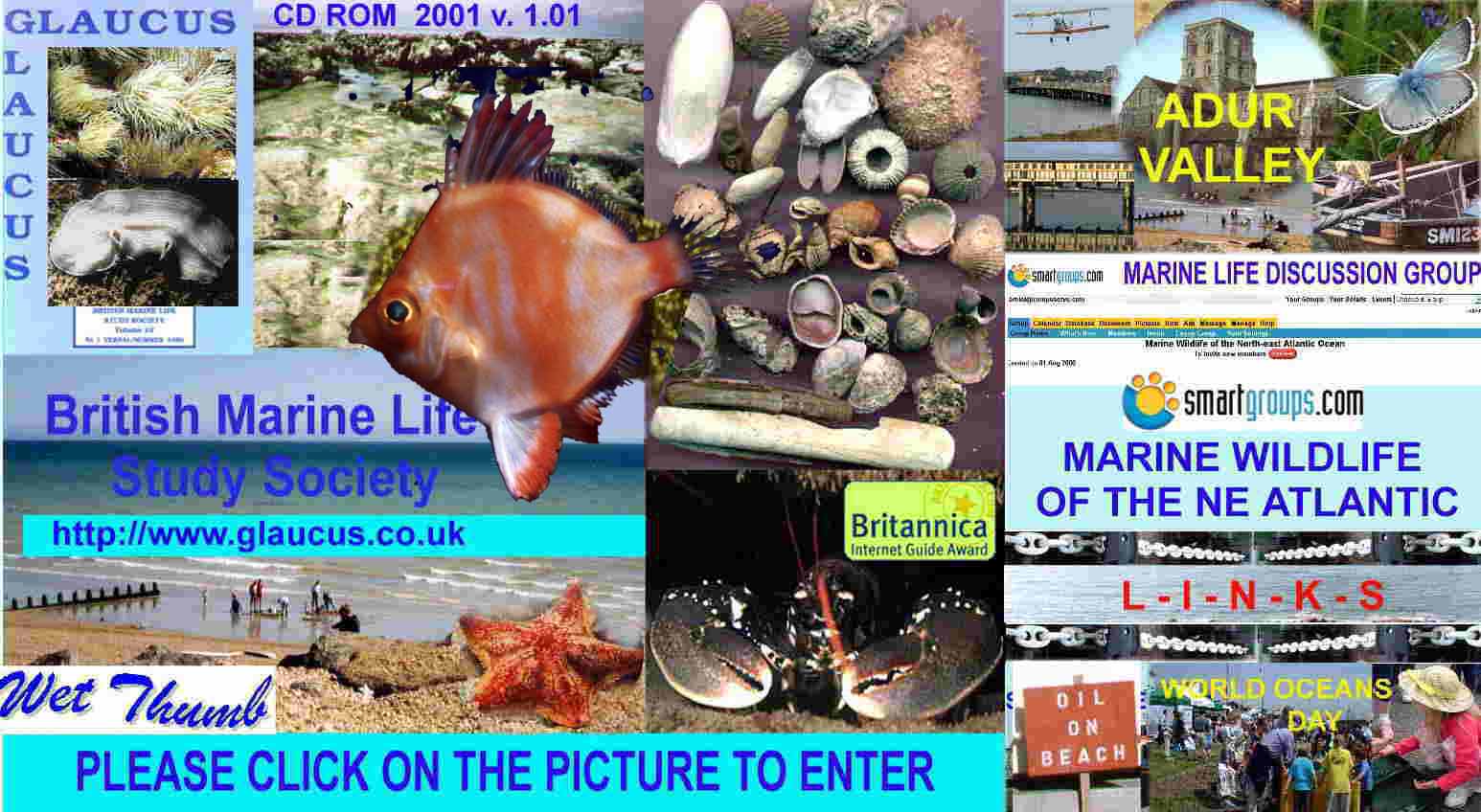
| The
Glaucus 2001 CDROM has
been sent out to Premier Members for last year. This information packed
disc contains the British Marine Life Study Society
web pages and other wildlife information (some not available through
the web site). This was a limited distribution copy because of technical
difficulties and the the next CD-ROM to be produced will be the Glaucus
2002 CD-ROM. New 2002 members subscribing for the CD-ROM will receive the
beta version until the tested copy is available.
On
8 November 2002, the main BMLSS computer broke down and this may have resulted
in restricted services for November 2002. A few EMails were lost at the
beginning of November. Please send a repeat EMail if you did not
receive a reply. |
MARINE WILDLIFE
NEWS
Reports
of marine wildlife from all around the British Isles, with pollution incidents
and conservation initiatives as they affect the flora and fauna of the
NE Atlantic Ocean.
 Late
November 2002
Late
November 2002
A
Short-snouted Seahorse,
Hippocampus hippocampus, is captured
by an oyster fisherman in the Solent.
In Victorian
times, there are records from off Dorset and the Solent.
Earlier
2002 Report from off Dorset
19
November 2002
A
dead Boar Fish,
Capros aper, was brought into the National
Marine Aquarium, Plymouth for identification.
The fishermen call them "Zulus" and used to catch them regularly, but they
are now almost unknown in the local catches, but I am told that lots are
caught by the beam trawlers fishing for Sole in deep water on the Parson's
and Great Sole Banks about 120 miles SW of the Lizard, Cornwall.
18
November 2002
Another
large Common
Octopus, Octopus
vulgaris, is captured alive off the Channel Islands and brought
into Guernsey alive but failed to survive the trauma and injury on capture.
This is the third one recorded since the beginning of October
2002.
Full
Report

Common Octopus
Photograph © by Richard
Lord (Guernsey)
Three
Common Octopuses were
also reported from Cornwall during the first weeks of November
2002.
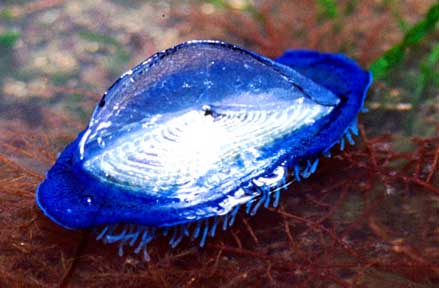 15
November 2002
15
November 2002
After
the recent gales, further large numbers of freshly dead Velella
are washed up on the Dorset (Studland) coast with over 50 counted in a
stretch of strandline of 100 metres. The dead Velella were still
coloured blue which showed that that they only recently dead. They disintegrate
and turn white over night. There were live specimens at five miles off
the Dorset coast.
Velella
2002
13
November 2002
An
exceptionally large Electric Ray,
Torpedo nobiliana, 25 kg and almost a metre across was brought in
alive at Plymouth and it found a home at the Blue
Reef Aquarium, Newquay. This ray is rarely seen in Public Aquaria,
because of their danger and the difficulty in keeping them. Unfortunately,
this specimen was damaged on capture and did not survive its ordeal.
5
November 2002
Collecting
a few rocks for aquarium props in fading light on Lancing
Beach, West Sussex, on a moonless evening under torchlight, I made
my first discovery of the Arch-fronted
Swimming Crab, Liocarcinus
arcuatus, at low tide. This is the
first BMLSS Report from the shore. The
identity of this crab has been confirmed by Dr.Reindert
Nijland.
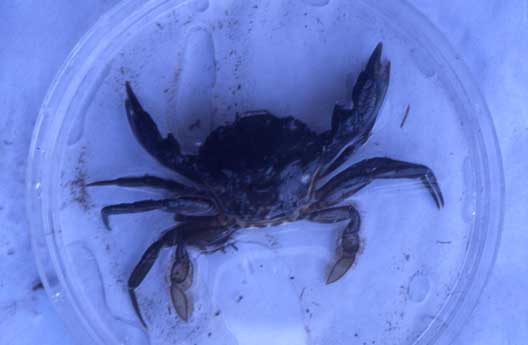
This small
specimen of this crab (carapace width 25 mm) had a heavy carpus on both
chelae, a rough carapace in chocolate brown, swimming legs that
were pointed, slower moving than Necora,
with also are pronounced creamy white underside, and at dusk that was only
its fractionally different movement that made it stand out from the Shore
Crab. There were no "teeth" between the eyes, and the carapace was
in a straight line between the eyes, with red antennae and antennules.
Full
Report
BMLSS
Intertidal Crabs
 2
November 2002
2
November 2002
The
capture on rod and line by Peter
Weight of a Boar
Fish, Capros aper,
from Hove beach is the very first record of this fish caught from the shore
off Sussex. The books
say that this fish lives in depths of over 100 metres and as there are
no seas of this depth on the English
side of the English Channel. This pretty little red
and silver rhomboidal fish about 55 mm long,
excluding its caudal fin, large eye and large mouth, with a spiky first
dorsal and vibrating second dorsal and second anal fins (vibrating like
the dorsal fin of a pipefish). Although this
fish is rarely caught, it is abundant in deepish water (on the edge of
the continental shelf in the western approaches of the English Channel)
and it is just that normal fishing methods do not capture this small fish.
All records and especially all live records from the shore or on dives,
and all Sussex records are newsworthy.
This
fish is thriving in the BMLSS private aquarium (Shoreham-by-Sea). This
fish is rarely on display in British Public Aquaria
and the only known display of this fish was for several years at Mevagissey
Harbour Aquarium.
This
specimen appeared live on Meridian TV Southern News on 6
November 2002.
On
10 November 2002, after a week in captivity,
the Boar Fish
commenced to feed on frozen brine shrimp after being initially encouraged
with live daphnia.
Previous
Sussex Record of a Boar Fish
Previous
Report from the Channel Islands
BMLSS
Boar Fish
Late
October 2002
A
Cornish fisherman reported netting a shoal of 10 stone (140 lb = 64
kg) of these small Boar Fish
just 10 miles off the Isles of Scilly whilst fishing for squid.

30
October 2002
A
Mantis Shrimp, Rissoides desmaresti,
was captured off Selsey Bill (Pullar Bank), West Sussex. The skipper of
a registered fishing vessel operating from Selsey caught the
shrimp
in his lobster pots. This was only the second he had ever caught in over
20 years commercial fishing from Selsey. Robert
Clark, Senior Fishery Officer with the Sussex Sea Fisheries Committee,
identified the shrimp to species level.
Report
by Tim Dapling (Sussex Sea Fisheries Committee)
BMLSS
Mantis Shrimps
News
1999 Page (Mantis Shrimp Report)
23
October 2002
An
organised whale watching boat trip off West Cork, Ireland, discovered the
usual cloud of Gannets
diving into the sea with three species of dolphins all feeding on the large
fish shoals. 30+ Atlantic White-sided Dolphins
Lagenorhynchus acutus, 20+ Common
Dolphins Delphinus delphis,
and a small group of four or five Striped
Dolphins, Stenella
coeruleoalba.
BMLSS
Cetaceans
11
October 2002
A
very large gastropod called the Triton
Whelk (now
usually called the Triton Shell),
Charonia lampas (L.), was discovered in the mouth of the River Fowey,
Cornwall, and put on display at Mevagissey
Harbour Aquarium. This is a very rare
find, and this large gastropod has only been recorded in British seas on
a few occasions. It is a southerly species known from the Mediterranean
Sea. It may have received assisted passage on the bottom of a boat?
Previous
Record from Cornwall
October
2002
Anglers
Gareth Larry and Ryan Dalziel caught
20 Redfish
(=Ocean Perch), Sebastes marinus, 40
miles north west of Muckle Flagg, Unst, northernmost island of the Shetland
Isles, at a depth of 166 metres (91 fathoms) with Coalfish (=Saithe), Pollachius
virens. The largest Redfish weighed 1.58 kg (3½ lb) and
this will probably qualify as a new species rod and line record for Britain.
The Redfish is a common fish of the Lophelia (deep water coral)
beds like the Sula Ridge. However, it is
a deep water species and in shallow water a similar species Sebastes
viviparus, sometimes called the Norway
Haddock is sometimes caught.
Report
in Sea Angler (December
2002 issue)
7 October
2002
A
Bluefin Tuna, Thunnus thynnus with a reported weight of 321
kg (708 lb) was caught off the north-west coast of Ireland by angler
Martin O'Malley.
Bluefin Tuna were also caught of the Galway coast and in Donegal Bay earlier
in the year. At least 24 tuna were hooked off the Irish coast in 2002.
Report
in Sea Angler (December
2002 issue)
BMLSS Tunnies
Late
August 2002
Three
specimens of the Short-snouted
Seahorse, Hippocampus
hippocampus,
were discovered about 95 miles east of the Solent in the English Channel.
They were picked up during DEFRA sponsored fish habitat studies by
the University of Wales Bangor research vessel Prince Madog.
Each came up in separate gear deployments, though at a single sampling
station. On UWTV the benthic biotope where they came from was seen to be
sand with a dense bed of tube worms, Lanice conchilega. All three
seahorses were "pregnant" males.
|

|
The
British Marine Life Study Society web pages are available for permanent
reference on the CD-ROM.
The
Homepage can now be accessed by typing in:
http://www.glaucus.co.uk
Sub-directories
cannot be accessed directly through this domain.
Please
send any reports of missing links and images to: Glaucus@hotmail.com

FORUM

MARINE
WILDLIFE
of
the NORTH-EAST ATLANTIC OCEAN
EFORUM
PAGE (LINK TO)
Forum
for discussion about the marine life of the North-east Atlantic Ocean,
including the North Sea, English Channel and all the seas around the British
Isles including Ireland, Iceland, Norway, Sweden, Denmark, Netherlands,
Belgium, France, Spain and Portugal.
This
forum can be used by members to report finds, ask questions, queries over
identification, concerns about environmental issues etc. This eForum is
participated in by members of many groups studying the marine environment.
Go
to menu bar above and click on Database and then on Marine Life Organisations
to find a list of web sites.
Photographs
and illustrations are best uploaded to the Document
Vault and should not exceed 75K in size (*.JPG).

The
Message Archive "Search Messages" facility is now working.
|
This
is a reminder about the operation of the Smart Group.
MARINE
WILDLIFE of the NORTH-EAST ATLANTIC OCEAN
Notes:
The
normal rules of eforum behaviour apply. Please keep on-topic as far as
possible.
Complaints
about messages should be sent directly to me. These will be
forwarded
on to the source of the complaint, unless it is specified that
the sender does not want this
to happen.
Spam
(off-topic emails etc.) will not be tolerated and any abusers of the
free
services could be banned immediately.
Special
points: Please
take care with your subject headings, as this helps researchers and
makes
life easier for everybody. Most EMail software has functions where
replies
can be sent to the original message sender, maintaining the thread.
Scientific
names with correct spellings are important on this Smart Group
to
enable researchers to use the Search Message Archive facility at a later
date to
find all entries under the scientific name.
|
|
DIARY
In
chronological order, the most recent events are at the top of the page.
Events open to the public, free or for a nominal charge only are included.
Most Seminars need to be booked in advance.
BIOSIS
Conference Calendar for Zoology
(Major
Link of all biological conferences around the world)
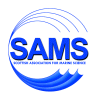 SAMS Seminar
Series
SAMS Seminar
Series
The Scottish
Association for Marine Science (SAMS)
Dunstaffnage Marine Laboratory,
Dunbeg, Oban, Argyll PA37 1QA
Tel: 01631 559000 Fax: 01631 559300
Email: mail@dml.ac.uk
For more details/how to find SAMS
see our website: http://www.sams.ac.uk
Unless otherwise stated, seminars are
held on Fridays at 4:15 pm
in the SAMS Conference Room
** Followed by the Friday R&R **
SEMINAR
SERIES
 Informal talks are
hosted by SAMS on FRIDAYS at 16.30 in the Conference Room.
These talks are given by researchers based at the Scottish Association
for Marine Science, Dunstaffnage Marine Laboratory and at other research
institutes throughout the UK and abroad. They present the very latest developments
in marine science and technology. All the talks are open to members
of the public and are available via video conferencing links.
Informal talks are
hosted by SAMS on FRIDAYS at 16.30 in the Conference Room.
These talks are given by researchers based at the Scottish Association
for Marine Science, Dunstaffnage Marine Laboratory and at other research
institutes throughout the UK and abroad. They present the very latest developments
in marine science and technology. All the talks are open to members
of the public and are available via video conferencing links.
-
13
December - John Gordon (SAMS). 30 years at sea - inshore to offshore
fisheries research at SAMS
For more
details on the forthcoming talks, please contact Murray Roberts (mailto:mr-t@dml.ac.uk)
or tel: 01631 559 000
|
CONFERENCES
|
|
| Southampton
Oceanography Centre |
 |
A series of monthly
talks on marine conservation topics
These
talks are open to the public, admission is free.
5 December
2002: Walking the Dogwhelk – Simon
Bray
2 January
2003: t.b.a.
6 February
2003: Seabirds in Hampshire, UK, and beyond
– Russel Wynn
The
Marine Life Talks are held on the first Thursday of the month at 7.30 pm,
please arrive at 7.15 pm to be met in Reception. Southampton Oceanography
Centre is reached via Dock Gate 4 (between Town Quay and Ocean Village).
Diary Page
(Link)

GATEWAY:
LINKS TO OTHER SITES
The
British Marine Life Study Society Web Site has been included as an Encyclopaedia
Britannica Recommended Site and included on the BBC
On-line Internet Guide.
There
are more entries on the GATEWAY pages of the BMLSS
Web Site. The logos for the various organisations have been removed to
reduce the size of this file.
Quick
reference links:

PUBLICATIONS
 Secret Life of Rock Pools
(Video)
Secret Life of Rock Pools
(Video)
Secret
Life of Low tide (Video)
"The
secret life of low tide" was filmed over 3 years for the Purbeck Marine
Wildlife Reserve, the Marine Conservation Society and the WildlifeTrusts.
This
video is an information packed guide to rockpooling,
giving details on how to find the intertidal marine life.
Presented
by marine biologist, Julie
Hatcher, this production is an essential
guide for anyone interested in life on our shores. With over 50 marine
animals and seaweeds this is a very informative video.
Click
on the image above for more information (on-line).
Recommended
for the younger viewer by Andy Horton
NOW AVAILABLE WITH
THE CD-ROM
THE SPECIES
DIRECTORY OF THE MARINE FAUNA AND FLORA OF THE BRITISH ISLES AND SURROUNDING
SEAS.
Edited
by C. Howson and B. Picton
Ulster
Museum & the Marine Conservation Society 1997.
About
£27.50 (including CD-ROM 1999)

The
project to collate the species that live in the seas off Britain is an
ongoing project. The Directory is a list of all the species grouped systematically
according to their scientific names, with a comprehensive bibliography.
The 1997 edition, not available until 1998, is the latest list and is useful
on the rare occasions (about once a week for me) that I have to look up
a vagrant, unusual species that is not listed in the usual identification
books.
Now
available with the CD-ROM, this proves useful list of all the species for
professionals, but it could be improved to make it more useful, e.g. facilities
for biological recording and an interchange with Recorder 2000.
MCS
books On-Line
BMLSS:
Marine Life Articles in Publications (Link)
PHOTOGRAPHS
|
This
is a simple project or request to members and readers of this Bulletin.
It is to take pictures of the coast when you are next down on the shore.

Boar
Fish
Photograph
by Steve Cropp (Hove)
This fish
is thriving in the BMLSS private aquarium (Shoreham-by-Sea).
This fish is rarely on display in British Public Aquaria
and the only known display of this fish was for several years at Mevagissey
Harbour Aquarium.
This
specimen appeared live on Meridian TV Southern News on 6
November 2002.
On
10 November 2002, after a week in captivity,
the Boar Fish
commenced to feed on frozen brine shrimp after being initially encouraged
with live daphnia. It ignored other alternative foods like boiled mussel
flesh, very small live prawns (mysid-sized), micro trout pellets (formed
into a ball). It seemed initially to feed better when the circulatory water
pump (powerhead) was turned off, but within an hour it recognised the food
and fed when the pump was on. Feeding was observed when the aquarium fluorescent
light was on and was continuous swallowing of very small particles of shrimp
collected in mid-water, and the water was kept in motion by the use of
an airstone attached to a powerful diaphragm air pump. If the particle
was disliked it would be examined and ignored, very occasionally it would
be swallowed and spat out again.
Previous
Sussex Record of a Boar Fish
Previous
Report from the Channel Islands
Aquarium
Observations:
Aligns
itself at an oblique angle to the current at night and sometimes at other
times. Very nervous disposition and will not feed for several days if netted
and moved or after being caught. This is a slight problem.
Feeds
on live daphnia and frozen brine shrimp, but needs encouragement to feed
and this is a worry at first. Finicky feeder, usually taking food only
of its preferred size, e.g. my small 55 mm fish will prefer frozen Artemia
to frozen mysis. After a bit (2 weeks), the fish will now take frozen mysis
as readily as Artemia (brine shrimp).
Even
general views have value, but ideally we would like photographs of the
shore showing the type of rock, topography and rock pools, dominant fauna,
and information that cannot be described adequately by words on the Report
Cards.
Kimmeridge
Bay Bay, Dorset
Photograph
by Steve
Trewhella
Please
take an opportunity to get a photograph of the waves breaking over an interesting
shore. These opportunities are not too frequent when the the tides, weather
and photographic conditions all coincide.
Steve
Trewhella's excellent photographs of undersea fish and invertebrates also
appear on the Marlin web pages.
The
name of the particular coast should be included and the grid reference,
if known. Print photographs can be included in Exhibitions
and on the BMLSS Web Sites and electronic publications. Electronic images
in *.JPG format can also be considered for the web site. They should not
exceed 100K in size.
 Click
on the album for more links (On-line link)
Click
on the album for more links (On-line link)
Shore
Topography Portfolio

|
| Printing
the two column version of Torpedo (from issue 28)
These
pages are not designed for the default settings on the Page Set-ups of
your browser. I recommend viewing in Internet Explorer 5 and altering the
right and left hand columns in the Page Set-up menu to 9 mm (from 19 mm).
The
page set-up can also be amended in Netscape Composer, and this has the
advantage of enabling the specified number of pages to be printed and the
information about the file (name, path, date) to be deleted. |
FULL MEMBERS 2002
British
Marine Life Study Society membership information was sent out with the
Shorewatch newsletter in January 2002.
If
you are unable to view this file with all its images through your EMail
software, one way around this is to go to your directory for incoming email,
where this file should be stored, and open the file Torped78.html in your
favourite browser. Microsoft Internet Explorer 4 and above is recommended.
 Some
of the images may not display if you have changed your directory for downloaded
files. The images may also not display properly if your settings on your
EMail software do not allow you do this automatically. Unfortunately, I
am unable to cater for all the Email software in use nowadays. I am looking
into this problem. When received in Pegasus the format is changed slightly,
but the bulletin is still readable.
Some
of the images may not display if you have changed your directory for downloaded
files. The images may also not display properly if your settings on your
EMail software do not allow you do this automatically. Unfortunately, I
am unable to cater for all the Email software in use nowadays. I am looking
into this problem. When received in Pegasus the format is changed slightly,
but the bulletin is still readable.

Compiled
on Netscape Composer
|


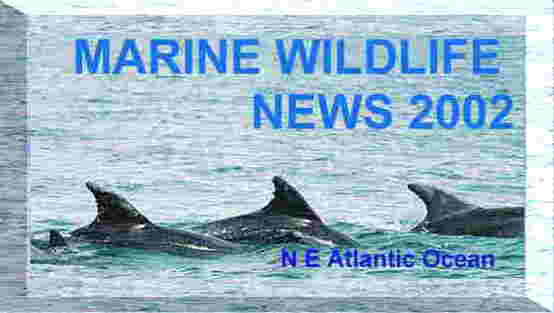











 Informal talks are
hosted by SAMS on FRIDAYS at 16.30 in the Conference Room.
These talks are given by researchers based at the Scottish Association
for Marine Science, Dunstaffnage Marine Laboratory and at other research
institutes throughout the UK and abroad. They present the very latest developments
in marine science and technology. All the talks are open to members
of the public and are available via video conferencing links.
Informal talks are
hosted by SAMS on FRIDAYS at 16.30 in the Conference Room.
These talks are given by researchers based at the Scottish Association
for Marine Science, Dunstaffnage Marine Laboratory and at other research
institutes throughout the UK and abroad. They present the very latest developments
in marine science and technology. All the talks are open to members
of the public and are available via video conferencing links.



